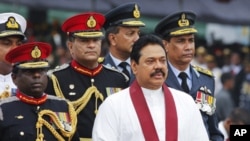Sri Lankan President Mahinda Rajapaksa says he plans to end the country's strict wartime emergency laws, which have been in place for nearly 30 years.
Speaking to Parliament Thursday, Mr. Rajapaksa said he believed there was no longer a need to have the laws since the country's civil war against Tamil Tiger separatists ended in 2009. He said abolishing the restrictions would help the country move ahead in a democratic way.
The laws give security forces sweeping powers of arrest and detention, but similarly tough powers remain under the Prevention of Terrorism act.
U.S. State Department spokeswoman Victoria Nuland said the move is a positive step for the Sri Lankan people. She added that the United States will continue to urge Sri Lanka to meet its obligations to international human rights laws.
The Sri Lankan government first imposed a state of emergency some three decades ago, removing it only for brief periods when Colombo entered into peace talks with the rebels. It was most recently re-imposed in 2005 after the assassination of then-Foreign Minister Lakshman Kadirgamar by suspected Tamil Tiger snipers.
Rights groups have long criticized the emergency laws, saying authorities used them to censor and crack down on opposition activists, journalists and trade unionists.
Official statements earlier this year showed that Sri Lanka was holding thousands of people without trial under the laws. It is unclear if and when any of these people would be released following the president's speech.




